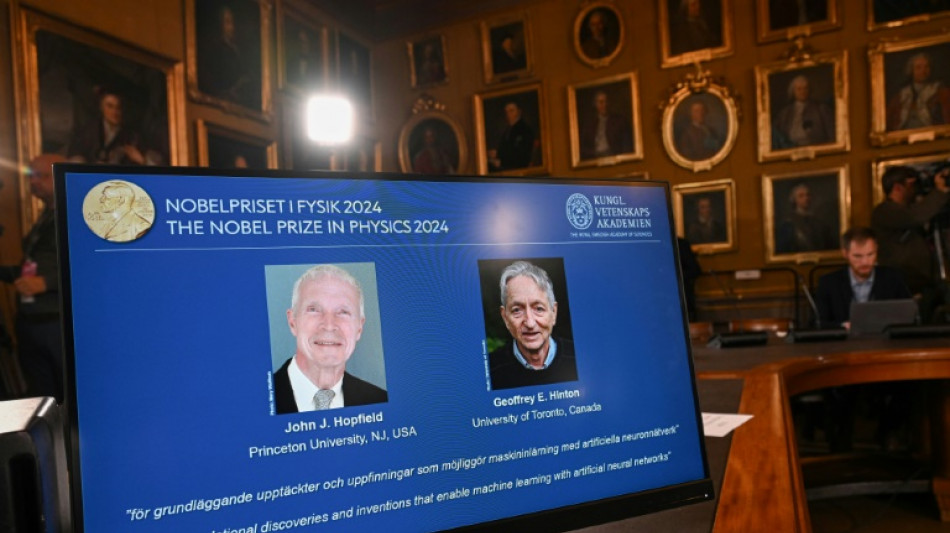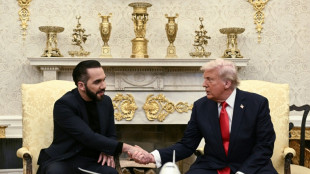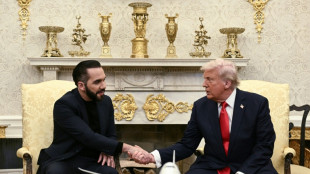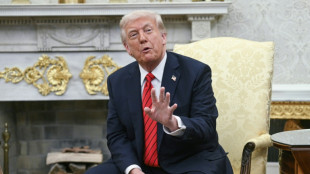
-
 El Salvador offers to swap US deportees with Venezuela
El Salvador offers to swap US deportees with Venezuela
-
Higgo holds on for win after Dahmen's late collapse

-
 El Salvador's president proposes prisoner exchange with Venezuela
El Salvador's president proposes prisoner exchange with Venezuela
-
Gilgeous-Alexander, Jokic, Antetokounmpo named NBA MVP finalists

-
 Thomas ends long wait with playoff win over Novak
Thomas ends long wait with playoff win over Novak
-
Thunder rumble to record win over Grizzlies, Celtics top Magic in NBA playoff openers

-
 Linesman hit by projectile as Saint-Etienne edge toward safety
Linesman hit by projectile as Saint-Etienne edge toward safety
-
Mallia guides Toulouse to Top 14 win over Stade Francais

-
 Israel cancels visas for French lawmakers
Israel cancels visas for French lawmakers
-
Russia and Ukraine trade blame over Easter truce, as Trump predicts 'deal'

-
 Valverde stunner saves Real Madrid title hopes against Bilbao
Valverde stunner saves Real Madrid title hopes against Bilbao
-
Ligue 1 derby interrupted after assistant referee hit by projectile

-
 Leclerc bags Ferrari first podium of the year
Leclerc bags Ferrari first podium of the year
-
Afro-Brazilian carnival celebrates cultural kinship in Lagos

-
 Ligue 1 derby halted after assistant referee hit by projectile
Ligue 1 derby halted after assistant referee hit by projectile
-
Thunder rumble with record win over Memphis in playoff opener

-
 Leverkusen held at Pauli to put Bayern on cusp of title
Leverkusen held at Pauli to put Bayern on cusp of title
-
Israel says Gaza medics' killing a 'mistake,' to dismiss commander

-
 Piastri power rules in Saudi as Max pays the penalty
Piastri power rules in Saudi as Max pays the penalty
-
Leaders Inter level with Napoli after falling to late Orsolini stunner at Bologna

-
 David rediscovers teeth as Chevalier loses some in nervy Lille win
David rediscovers teeth as Chevalier loses some in nervy Lille win
-
Piastri wins Saudi Arabian Grand Prix, Verstappen second

-
 Kohli, Rohit star as Bengaluru and Mumbai win in IPL
Kohli, Rohit star as Bengaluru and Mumbai win in IPL
-
Guirassy helps Dortmund past Gladbach, putting top-four in sight

-
 Alexander-Arnold lauds 'special' Liverpool moments
Alexander-Arnold lauds 'special' Liverpool moments
-
Pina strikes twice as Barca rout Chelsea in Champions League semi

-
 Rohit, Suryakumar on song as Mumbai hammer Chennai in IPL
Rohit, Suryakumar on song as Mumbai hammer Chennai in IPL
-
Dortmund beat Gladbach to keep top-four hopes alive

-
 Leicester relegated from the Premier League as Liverpool close in on title
Leicester relegated from the Premier League as Liverpool close in on title
-
Alexander-Arnold fires Liverpool to brink of title, Leicester relegated

-
 Maresca leaves celebrations to players after Chelsea sink Fulham
Maresca leaves celebrations to players after Chelsea sink Fulham
-
Trump eyes gutting US diplomacy in Africa, cutting soft power: draft plan

-
 Turkey bans elective C-sections at private medical centres
Turkey bans elective C-sections at private medical centres
-
Lebanon army says 3 troops killed in munitions blast in south

-
 N.America moviegoers embrace 'Sinners' on Easter weekend
N.America moviegoers embrace 'Sinners' on Easter weekend
-
Man Utd 'lack a lot' admits Amorim after Wolves loss

-
 Arteta hopes Arsenal star Saka will be fit to face PSG
Arteta hopes Arsenal star Saka will be fit to face PSG
-
Ukrainian troops celebrate Easter as blasts punctuate Putin's truce

-
 Rune defeats Alcaraz to win Barcelona Open
Rune defeats Alcaraz to win Barcelona Open
-
Outsider Skjelmose in Amstel Gold heist ahead of Pogacar and Evenepoel

-
 Arsenal make Liverpool wait for title party, Chelsea beat Fulham
Arsenal make Liverpool wait for title party, Chelsea beat Fulham
-
Trump slams 'weak' judges as deportation row intensifies

-
 Arsenal stroll makes Liverpool wait for title as Ipswich face relegation
Arsenal stroll makes Liverpool wait for title as Ipswich face relegation
-
Sabalenka to face Ostapenko in Stuttgart final

-
 Kohli, Padikkal guide Bengaluru to revenge win over Punjab
Kohli, Padikkal guide Bengaluru to revenge win over Punjab
-
US aid cuts strain response to health crises worldwide: WHO

-
 Birthday boy Zverev roars back to form with Munich win
Birthday boy Zverev roars back to form with Munich win
-
Ostapenko eases past Alexandrova into Stuttgart final

-
 Zimbabwe on top in first Test after Bangladesh out for 191
Zimbabwe on top in first Test after Bangladesh out for 191
-
De Bruyne 'surprised' over Man City exit


Neural networks, machine learning? Nobel-winning AI science explained
The Nobel Prize in Physics was awarded to two scientists on Tuesday for discoveries that laid the groundwork for the artificial intelligence used by hugely popular tools such as ChatGPT.
British-Canadian Geoffrey Hinton, known as a "godfather of AI," and US physicist John Hopfield were given the prize for "discoveries and inventions that enable machine learning with artificial neural networks," the Nobel jury said.
But what are those, and what does this all mean? Here are some answers.
- What are neural networks and machine learning? -
Mark van der Wilk, an expert in machine learning at the University of Oxford, told AFP that an artificial neural network is a mathematical construct "loosely inspired" by the human brain.
Our brains have a network of cells called neurons, which respond to outside stimuli -- such as things our eyes have seen or ears have heard -- by sending signals to each other.
When we learn things, some connections between neurons get stronger, while others get weaker.
Unlike traditional computing, which works more like reading a recipe, artificial neural networks roughly mimic this process.
The biological neurons are replaced with simple calculations sometimes called "nodes" -- and the incoming stimuli they learn from is replaced by training data.
The idea is that this could allow the network to learn over time -- hence the term machine learning.
- What did Hopfield discover? -
But before machines would be able to learn, another human trait was necessary: memory.
Ever struggle to remember a word? Consider the goose. You might cycle through similar words -- goon, good, ghoul -- before striking upon goose.
"If you are given a pattern that's not exactly the thing that you need to remember, you need to fill in the blanks," van der Wilk said.
"That's how you remember a particular memory."
This was the idea behind the "Hopfield network" -- also called "associative memory" -- which the physicist developed back in the early 1980s.
Hopfield's contribution meant that when an artificial neural network is given something that is slightly wrong, it can cycle through previously stored patterns to find the closest match.
This proved a major step forward for AI.
- What about Hinton? -
In 1985, Hinton revealed his own contribution to the field -- or at least one of them -- called the Boltzmann machine.
Named after 19th century physicist Ludwig Boltzmann, the concept introduced an element of randomness.
This randomness was ultimately why today's AI-powered image generators can produce endless variations to the same prompt.
Hinton also showed that the more layers a network has, "the more complex its behaviour can be".
This in turn made it easier to "efficiently learn a desired behaviour," French machine learning researcher Francis Bach told AFP.
- What is it used for? -
Despite these ideas being in place, many scientists lost interest in the field in the 1990s.
Machine learning required enormously powerful computers capable of handling vast amounts of information. It takes millions of images of dogs for these algorithms to be able to tell a dog from a cat.
So it was not until the 2010s that a wave of breakthroughs "revolutionised everything related to image processing and natural language processing," Bach said.
From reading medical scans to directing self-driving cars, forecasting the weather to creating deepfakes, the uses of AI are now too numerous to count.
- But is it really physics? -
Hinton had already won the Turing award, which is considered the Nobel for computer science.
But several experts said his was a well-deserved Nobel win in the field of physics, which started science down the road that would lead to AI.
French researcher Damien Querlioz pointed out that these algorithms were originally "inspired by physics, by transposing the concept of energy onto the field of computing".
Van der Wilk said the first Nobel "for the methodological development of AI" acknowledged the contribution of the physics community, as well as the winners.
"There is no magic happening here," van der Wilk emphasised.
"Ultimately, everything in AI is multiplications and additions."
G.Frei--VB



